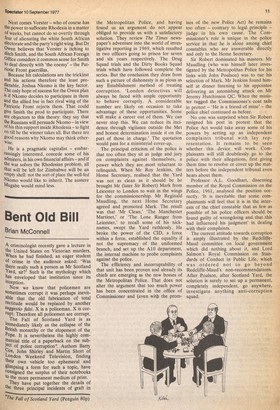Bent Old Bill
Brian McConnell
A criminologist recently gave a lecture in the United States on Victorian murders. When he had finished, an eager student Of crime in the audience asked: 'Was there really such a person as Mr Scotland Yard, sir?' Such is the mythology which has enveloped that institution since its inception. Now we know that policemen are sometimes corrupt it was perhaps inevitable that the old fabrication of total rectitude would be replaced by another suggestio falsi. X is a policeman. X is corrupt. Therefore all policemen are corrupt. The Fall of Scotland Yard is as immediately likely as the collapse of the British monarchy or the elopement of the Pope. It is nevertheless the highly com!'nercial title of a paperback on the subject of police corruption*. Authors Barry Cox, John Shirley and Martin Short of London Weekend Television, finding their own vehicle too ephemeral and glimpsing a form for such a topic, have Consigned the surplus of their notebooks to the more permanent medium of print. They have put together the details of the three principal incidents of graft in "4"......1•■••••=1.111■111.1101111.1•11■11*..._ The Fall of Scotland Yard (Penguin 80p) the Metropolitan Police, and having found us an argument do not appear obliged to provide us with a satisfactory solution. They review The Times newspaper's adventure into the world of investigative reporting in 1969, which resulted in two officers going to prison for seven and six years respectively. The Drug Squad trials and the Dirty Books Squad trials which have followed complete the series. But the conclusion they draw from such a picture of dishonesty is as pious as any Establishment method of treating corruption. 'London detectives will always be faced with ample opportunity to behave corruptly. A considerable number are likely on occasion to take advantage of these opportunities. Some will make a career out of them. We can never stop this. We can reduce its incidence through vigilance outside the Met and honest determination inside it on the part of those in charge.' The quotation would pass for a ministerial cover-up.
The principal criticism of the police is that too often they sit as judge and jury on complaints against themselves, a power which they are most reluctant to relinquish. When Mr Roy Jenkins, the Home Secretary, realised that the Yard was not as clean as it should be he brought Mr (later Sir Robert) Mark from Leicester to London to wait in the wings for the commissionership. Mr Reginald Maudling, the next Home Secretary agreed and promoted Mark. The result was that 'Mr Clean,' The Manchester Martinet,' or 'The Lone Ranger from Leicester,' to recall some of his nicknames, swept the Yard ruthlessly. He broke the power of the CID, a force within a force, established the equality if not the supremacy of the uniformed branch, and set up the A10 department, the internal machine to probe complaints against the police.
The efficiency and incorruptability of that unit has been proven and already its chiefs are emerging as the new bosses of the Metropolitan Police. That does not alter the argument that too much power has been concentrated in the office of Commissioner and (even witb the prom ises of the new Police Act) he remains too often — contrary to legal principle — judge in his own cause. The Commissioner's role is unique in the police service in that he is alone among chief constables who are answerable directly and only to the Home Secretary.
Sir Robert dominated his masters. Mr Maudling (who was himself later investigated by the Metropolitan Police for his links with John Poulson) was to rue his selection of Mark. Mr Jenkins found himself at dinner listening to his appointee delivering an astonishing attack on Mr Jeremy Hutchinson QC. When the minister tugged the Commissioner's coat tails in protest — 'He is a friend of mine' — the police chief continued as before.
No one was surprised when Sir Robert resigned his post in protest that the Police Act would take away some of his powers by setting up an independent complaints tribunal with lay representation. It remains to be seen whether this device will work. Complainants will still doubtlessly go to the police with their allegations, first giving them time to resolve or cover up the matters before the independent tribunal even hears about them.
Professor A.L. Goodhart, dissenting member of the Royal Commission on the Police, 1961, analysed the position correctly. 'It is inevitable that some cornplaintants will feel that it is in the interests of the chief constable that as few as possible of his police officers should be found guilty of wrongdoing and that this had influenced his judgment' in dealing with their complaints.
The current attitude towards corruption is amply illustrated by the RedcliffeMaud committee on local government which did nothing about it, and Lord Salmon's Royal Commission on Standards of Conduct in Public Life, which was ordered not to go beyond Redcliffe-Maud's non-recommendations. After Poulson, after Scotland Yard, the solution is surely to set up a permanent, completely independent, go anywhere, investigate anything anti-corruption squad.






























 Previous page
Previous page